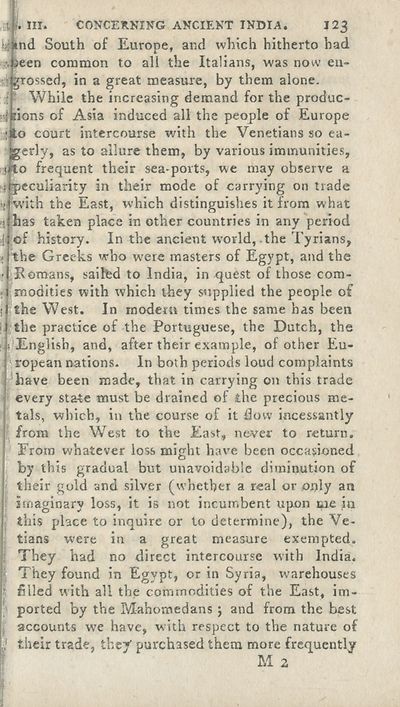Occupations > Historical disquisition concerning the knowledge which the ancients had of India; and the progress of trade with that country
(137)
Download files
Complete book:
Individual page:
Thumbnail gallery: Grid view | List view

l! L III. CONCERNING ANCIF.KT INDIA. 123
ij) ind South of Europe, and which hitherto had
•. seen common to all the Italians, was now en-
l grossed, in a great measure, by them alone,
if ! While the increasing demand for the produc-
<nt rions of Asia induced all the people of Europe
! to court intercourse with the Venetians so ea¬
gerly, as to allure them, by various immunities,
i to frequent their sea ports, we may observe a
^peculiarity in their mode of carrying on trade
<f with the East, which distinguishes it from what
>1 has taken place in other countries in any period
1 of history. In the ancient world, the Tyrians,
» the Greeks who were masters of Egypt, and the
f Romans, sailfed to India, in quest of those com-
; modities with which they supplied the people of
i the West. In modern times the same has been
I the practice of the Portuguese, the Dutch, the
: ( English, and, after their example, of other Eu¬
ropean nations. In both periods loud complaints
have been made, that in carrying on this trade
every state must be drained of the precious me¬
tals, which, in the course of it flow incessantly
| from the West to the East, never to return.
From whatever loss might have been occasioned
by this gradual but unavoidable diminution of
i their gold and silver (whether a real or only an
| imaginary loss, it is not incumbent upon me io
5 this place to inquire or to determine), the Ve-
| tians were in a great measure exempted,
i They had no direct intercourse with India.
1 They found in Egypt, or in Syria, warehouses
I filled with all thp commodities of the East, im¬
ported by the Mahomedans ; and from the best
I accounts we have, with respect to the nature of
' their trade, they purchased them more frequently
M 2
ij) ind South of Europe, and which hitherto had
•. seen common to all the Italians, was now en-
l grossed, in a great measure, by them alone,
if ! While the increasing demand for the produc-
<nt rions of Asia induced all the people of Europe
! to court intercourse with the Venetians so ea¬
gerly, as to allure them, by various immunities,
i to frequent their sea ports, we may observe a
^peculiarity in their mode of carrying on trade
<f with the East, which distinguishes it from what
>1 has taken place in other countries in any period
1 of history. In the ancient world, the Tyrians,
» the Greeks who were masters of Egypt, and the
f Romans, sailfed to India, in quest of those com-
; modities with which they supplied the people of
i the West. In modern times the same has been
I the practice of the Portuguese, the Dutch, the
: ( English, and, after their example, of other Eu¬
ropean nations. In both periods loud complaints
have been made, that in carrying on this trade
every state must be drained of the precious me¬
tals, which, in the course of it flow incessantly
| from the West to the East, never to return.
From whatever loss might have been occasioned
by this gradual but unavoidable diminution of
i their gold and silver (whether a real or only an
| imaginary loss, it is not incumbent upon me io
5 this place to inquire or to determine), the Ve-
| tians were in a great measure exempted,
i They had no direct intercourse with India.
1 They found in Egypt, or in Syria, warehouses
I filled with all thp commodities of the East, im¬
ported by the Mahomedans ; and from the best
I accounts we have, with respect to the nature of
' their trade, they purchased them more frequently
M 2
Set display mode to:
![]() Universal Viewer |
Universal Viewer | ![]() Mirador |
Large image | Transcription
Mirador |
Large image | Transcription
| Antiquarian books of Scotland > Occupations > Historical disquisition concerning the knowledge which the ancients had of India; and the progress of trade with that country > (137) |
|---|
| Permanent URL | https://digital.nls.uk/125577417 |
|---|
| Description | Thousands of printed books from the Antiquarian Books of Scotland collection which dates from 1641 to the 1980s. The collection consists of 14,800 books which were published in Scotland or have a Scottish connection, e.g. through the author, printer or owner. Subjects covered include sport, education, diseases, adventure, occupations, Jacobites, politics and religion. Among the 29 languages represented are English, Gaelic, Italian, French, Russian and Swedish. |
|---|

